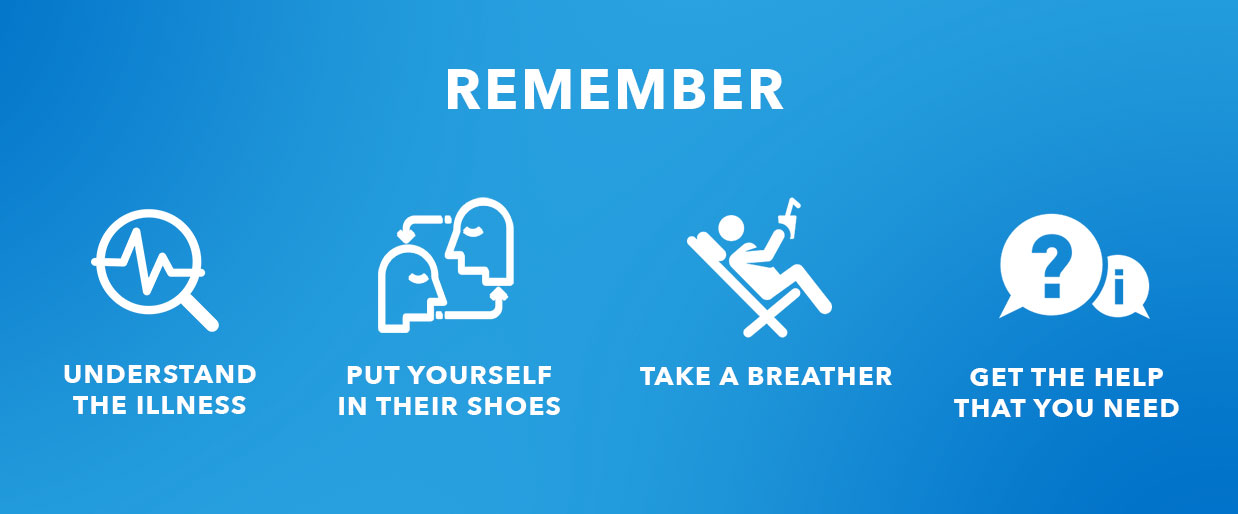Three Ways to Boost Your Immune System During the Covid-19...
Read MoreDealing with Your Parent’s Dementia

Dealing with Dementia
There are over 16 million Americans who are dealing with caring for their elderly loved ones living with Alzheimer’s or other forms of dementia. If you happen to be one of them, you might be one of the millions who, on a daily basis, try to deal with the unique challenges that come with taking care of someone living with this progressive illness.
You’ve seen what dementia looks like in the life of your parent, and you know that people living with dementia go through a lot. They start forgetting things that they know by heart, like directions to their favorite restaurants or how to use everyday appliances. They get confused and have a hard time resolving problems by themselves. At times, they don’t even remember where they are, where they need to go, or sadly, who they are.
These drastic changes are difficult to deal with, causing them to become distant or have sudden emotional outbursts. And if your parent has dementia, it can certainly be quite demanding and stressful.
There are many challenges associated with looking after someone living with an illness that affects his or her behavior, memory, and reasoning skills. What can you do to cope with these changes?
Understanding Dementia
Getting a solid grasp of the illness and what it can do to your loved one can help give you a better understanding of what it takes to look after your parent better. “It’s important to remember that dementia goes beyond forgetfulness or memory loss,” remarks Luisa Remponi, RN, BSN, MSN, AGPCNP, PSS Home Care’s Director of Patient Services.
“There are many behavioral changes associated with dementia, and it’s essential to be familiar with the signs and symptoms so that you can be prepared for them as they manifest in your loved one. These vary from person to person and can change over time,” states Remponi.
 Expect changes in communication to manifest in your loved ones.
Expect changes in communication to manifest in your loved ones.One of the major changes you’ll observe is in the way your parent with dementia communicates with you. They may not understand what words mean, or forget how to speak a second language, such as English. Because you know that this is one of the things that is common for dementia patients, you expect changes in communication to manifest in your loved ones.
When dealing with dementia in a parent, you’ll remember to:
- Be warm and loving, understanding that your parent is having difficulty expressing his or her thoughts verbally
- Be more conscious of your body language, your tone, and the loudness of your voice
- Make sure that your parent still feels independent and involved in their lives by allowing them to make decisions
- Be patient with emotional outbursts
Read up, listen to podcasts, or watch videos to further increase your knowledge about Alzheimer’s and other forms of dementia. “You can also talk with your family physician to know what you should expect and to help point you to good sources of information,” added Remponi. One of which is the Alzheimer’s and related Dementias Education and Referral (ADEAR) Center of the National Institute on Aging (NIA)
"It's important to remember that dementia goes beyond forgetfulness or memory loss."
Put yourself in your parent’s shoes
Empathy, or the ability to understand or relate to what someone is going through or feeling, is one of the more vital feelings you must be armed with. “Can you imagine not being able to remember how to tie your own shoelaces, or remember what you do for a living, or the names of your children? It’s absolutely frightening, and it’s what our loved ones living with dementia go through each day,” shares Van Barroso, an experienced caregiver who has been taking care of dementia patients for the past seven years. “Keeping that in mind can help you better understand how they experience reality, and be more compassionate of what they’re going through.”
"Be more compassionate of what they're going through"
Take a breather
Caring for your parent living with dementia can take a lot out of you — physically and emotionally. 40% to 70% of family caregivers who provide assistance to loved ones living with dementia show clinically significant signs of depression.1 On top of this, 11% of family caregivers report a decline in their physical health, especially those who assist their parent with dementia with a number of activities of daily living (ADLs).2
“Caregivers must learn how to deal with the taxing nature of caregiving by making a conscious effort to take good care of themselves. Eat well, have enough rest, and make sure that you have someone to talk to when things get tough,” shares Remponi. “The less stressed you are, the more effectively you can provide care for your parent.”
"The less stressed you are, the more effectively you can provide care for your parent."
Get the help that you need
Help comes in all shapes and sizes. Whether it’s emotional support from a group of people who understand the demands of caregiving, learning about different caregiving strategies from online resources, or getting professional assistance from hourly or live-in home health aides, it’s essential to find the type of aid that works for you the most. “Don’t hesitate to ask for a helping hand, especially when things get rough. There will always be tough times in the lives of dementia caregivers,” remarks Barosso.
Dealing with Dementia Patients
Caregiving for a parent with dementia is, after all, can be extremely demanding. In fact, 4 in 10 family caregivers report that their situation is highly stressful, and only 1 in 12 states that they feel that their overall health has improved by taking care of a loved one. It’s important to note too that studies have shown that the rates of depression increases as the stage of dementia becomes more severe.
Getting help may also become indispensable for you as time goes by. “Dementia is progressive. Unfortunately, this may mean that the level of difficulty will also increase as time passes, in which case caregivers may need additional assistance to ensure that the patient’s needs are fully met, and that comfort and security are achieved,” states Remponi.
"Don't hesitate to ask for a helping hand, especially when things get rough."
Caring is our Culture
At PSS Home Care, we provide top-notch assistance to the elderly, as well as people living with disabilities, chronic illnesses, or cognitive impairments. Our caregivers help our clients with activities of daily living such as bathing, dressing, and grooming, among many others. They also prepare healthy meals and oversee the administration of prescribed medication. These and more are what make PSS Home Care’s brand of compassionate care exceptional.
For more information about our home care services, contact us at 718-752-9833. We’d be glad to discuss our best available care options for your loved ones today.
____________________________________________________
1 Zarit, S. (2006). Assessment of Family Caregivers: A Research Perspective.
2 National Alliance for Caregiving and AARP. (2015). Caregiving in the U.S.
Check out our other articles
The PSS Home Care Difference
The PSS Home Care Difference In our recent blog, we...
Read MoreThe Importance of Preventing Outbreaks of Measles in Elderly
The Importance of Preventing Outbreaks of Measles in Elderly To...
Read MoreCoping with Covid-19: Managing Stress, Anxiety Amid A Global Pandemic
Coping with Covid-19: Managing Stress, Anxiety Amid A Global Pandemic...
Read More




